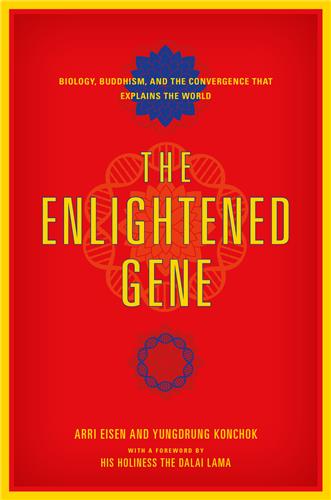This thought-provoking text is a welcome addition to efforts at building bridges of respect and understanding between purely matter-based scientific probes and Buddhist insights on the mind and its mysteries. . . . Highly recommended.
Eight years ago, in an unprecedented intellectual endeavor, the Dalai Lama invited Emory University to integrate modern science into the education of the thousands of Tibetan Buddhist monks and nuns in exile in India. This project, the Emory Tibet Science Initiative, became the first major change in the monastic curriculum in six centuries. Eight years in, the results are transformative. The singular backdrop of teaching science to Tibetan Buddhist monks and nuns offered provocative insights into how science and religion can work together to enrich each other, as well as to shed light on life and what it means to be a thinking, biological human. In The Enlightened Gene, Emory University Professor Dr. Arri Eisen, together with monk Geshe Yungdrung Konchok explore the striking ways in which the integration of Buddhism with cutting-edge discoveries in the biological sciences can change our understanding of life and how we live it. What this book discovers along the way will fundamentally change the way you think. Are humans inherently good? Where does compassion come from? Is death essential for life? Is experience inherited? These questions have occupied philosophers, religious thinkers and scientists since the dawn of civilization, but in today’s political discourse, much of the dialogue surrounding them and larger issues—such as climate change, abortion, genetically modified organisms, and evolution—are often framed as a dichotomy of science versus spirituality. Strikingly, many of new biological discoveries—such as the millions of microbes that we now know live together as part of each of us, the connections between those microbes and our immune systems, the nature of our genomes and how they respond to the environment, and how this response might be passed to future generations—can actually be read as moving science closer to spiritual concepts, rather than further away. The Enlightened Gene opens up and lays a foundation for serious conversations, integrating science and spirit in tackling life’s big questions. Each chapter integrates Buddhism and biology and uses striking examples of how doing so changes our understanding of life and how we lead it.


This thought-provoking text is a welcome addition to efforts at building bridges of respect and understanding between purely matter-based scientific probes and Buddhist insights on the mind and its mysteries. . . . Highly recommended.
Chronicles a fascinating dialogue. . . . There are real benefits for humanity to be gained by this historic encounter. I highly recommend this book.
The remarkable intellectual and spiritual voyage of an American biology professor and a Tibetan Buddhist monk exploring how the basic principles of cell biology, developmental biology, and neuroscience can be viewed as Buddhist themes on impermanence, the eternal cycle of life and death, and the communality of all creatures, small or large.
This book . . . represents something close to my heart. [It is a] real collaboration between a modern scientist and a Tibetan monk-scholar. Their work represents not only scholarly achievement but also the friendship and understanding that can come from open dialogue between great intellectual traditions. . . . I have no doubt that all who read this book will benefit from the insights generated by the convergence of science’s understanding of the material world and contemplative traditions’ understanding of the workings of the mind.
ARRI EISEN is a Professor of Pedagogy in Biology, the Institute of the Liberal Arts, and the Center for Ethics at Emory University. He founded and has directed for over a decade Emory’s Program in Science & Society, which develops innovative programs for the public and students in and out of the classroom in science and religion, science and ethics, and science and art. GESHE YUNGDRUNG KONCHOK was born in 1982 in a mountainous village between Tibet and Nepal. Konchok runs the Tibetan Yungdrung Bon Library at his monastery. He was in the initial group of monastics of the Emory Tibet Science Initiative in 2008 in Dharamsala and was selected as a Tenzin Gyatso scholar with five other monks from that cohort to study science at Emory for three years. Konchok attained his geshe degree at Menri in 2014, and he has been serving as a translator in the Emory Tibet Science Initiative since then.

Founded in 1971, Brandeis University Press is a nonprofit publisher dedicated to publishing innovative, high-quality books for a general audience, as well as scholarship that advances knowledge and promotes dialogue in the humanities, arts, and social sciences around the world.
© Copyright 2024, Brandeis University Press
Brandeis University Press
Goldfarb Library 69-235, MS 046
Brandeis University
415 South Street
Waltham, MA 02453
(781) 736-4547
pressinfo@brandeis.edu

Stay up to date with the newest titles and promotions from Brandeis University Press—while saving 20% on your first purchase.